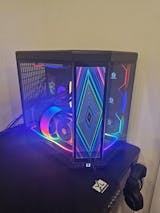Whether you’re beginning your custom build or you’re casually browsing for a new and improved processor, Intel has a few solutions that can take your PC’s performance to the next level. Deciding between processors can be daunting, but XOTIC PC has the experience and know-how you need to make the wisest investment for computing, gaming, or other tasks. In this article, we explore the advantages and disadvantages of the i7-8700K vs. i7-7820X processors, so you can determine which processor is ideal for everyday use.
i7-8700K vs. i7-7820X
Intel is an industry-leading manufacturer of processing technology. Enthusiasts can expect comparisons between two of the top processor brands: Intel and AMD. When Intel released the eight-core i7-7820X processor, comparisons to Ryzen 7 models were inevitable. Shortly thereafter, Intel released the hexa-core i7-8700K processor, which redraws the battle lines between Intel and AMD. But how do these desktop processors compare to each other? Let’s find out!
Features: The i7-8700K is a hexa-core processor that makes leaps and bounds over past Coffee Lake generations. Intel upped the core count in this processor to compete with AMD’s Ryzen and Threadripper. The i7-8700K features six cores, 12 threads, and higher frequencies than the competition. Hyper-threading provides ample room for a stable overclock, which is wonderful news for gaming enthusiasts that want to squeeze as much performance from existing components. Both the i7-7820X and the i7-8700K feature base clock speeds of 3.6 GHz, but the i7-8700K processor provides one extra megabyte of cache memory (11 MB vs. 12 MB).
If you’re concerned with heat, the thermal design power (TDP) of your next processor will play an important role in your decision. The i7-8700K generates up to 95 W, but the i7-7820X generates up to 140W. Processor power is an important benchmark – the lower, the better unless you can afford the cooling equipment required to produce extra headroom. High TDP generally results in higher clock speeds, but TDP generally does not impact performance.
Overclocking: X-series desktop processors like the i7-7820X are unlocked to provide additional headroom. You can now overclock each core individually, AVX ratio controls for extra stability, and VccU settings for extreme scenarios. When you choose a motherboard that’s based on Intel’s 300-series chipsets, you can also overclock the i7-8700K’s default speed of 3.7GHz to 5GHz on all six cores by changing the BIOS options.
Pricing: With core counts on the rise, you can expect a small price increase. You can find the i7-7820X processor for just over $450. The i7-8700K for just over $300. However, those up-front costs should be the least of your concerns. If you decide to purchase the i7-8700K, you will need to purchase a brand-new motherboard.
As we mentioned earlier, processor power is important. Extra TDP translates to extra energy consumption, as well as increased costs to cool and operate. You need to double check the processor generation to confirm compatibility with other components, so you know how much the hidden costs might be. Ultimately, the decision is up to you, what you can afford, and your expectations for intended use.













